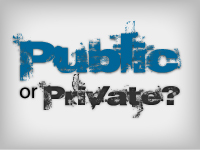Resources at a Glance
What is RSS?
- ProBlogger description of RSS
- RSS in Plain English (YouTube Video)
What are some popular blogs?
What are some popular blogging tools?
Blog It
What are blogs?
Still confused about blogs? Or wondering what the big deal is? The article 7 things you should know about blogs might address some of your questions or concerns. So why blog? Blogs are cool because they allow for constant self-expression and reflection, and for universal self-publication. One of the keys to opening the world up to greater educational opportunities is to give people the tools they need to learn, and to make these tools available to everyone, all the time, at any place in the world. But how are blogs delivered to the world?
 Blogs can be hosted (i.e. put on a server) publically or privately. Publically hosted blogs are often found on large blogging providers like Blogger.com, WordPress.com, and Livejournal.com. These services are generally free of charge (though not always), and it is relatively easy to set up and run a blog on them. Blogs that are publically hosted are often not fully customizable or configurable, but they come packed with a large array of choices and templates to choose from right out of the box.
Blogs can be hosted (i.e. put on a server) publically or privately. Publically hosted blogs are often found on large blogging providers like Blogger.com, WordPress.com, and Livejournal.com. These services are generally free of charge (though not always), and it is relatively easy to set up and run a blog on them. Blogs that are publically hosted are often not fully customizable or configurable, but they come packed with a large array of choices and templates to choose from right out of the box.
Privately hosted blogs (blogs you host on your own server space) are a whole different monster. They are much more fully configurable and customizable (depending on the software you use), but they may require more time and effort to set up and maintain (though not always). Privately hosting your blog on your own server is not for the faint of heart. It may require you to know at least a little about several types of Web technologies, including PHP, SQL, HTML, CSS, and JavaScript. Some services may be provided by your hosting company, but in the end, if you want to fully customize and configure your blog, you are going to have to bite the bullet and learn some techie stuff (thankfully, with most popular blogging software there are large user communities who are more than willing to share their knowledge and code with the world). You’re also probably going to have to pay a nominal fee for the use of server space (but you will get your own unique URL like "iliketoeatcheese.com"). Beyond the ability to configure the blog the way you want it, there is also often (but not always) the added ability to set security options to be exactly what you want (e.g. deny access to all but the people you approve). In short, privately hosting your blog may or may not be more secure, may or may not be easier to set up or maintain, and may or may not be cheaper than publically hosting your blog (you’ll have to do the homework yourself to find the best solution for your needs). One thing is for sure, though, with a privately hosted blog you are going to have more options to set it up the way you want it. If you are interested in setting up your own privately hosted blog, check out these resources:
- Guide to installing a privately hosted WordPress blog
- Walkthrough for installing a privately hosted WordPress blog
When using blogs in educational settings, it may make it easier on new bloggers just to use a popular publically hosted blog (like WordPress.com or Blogger.com) in order to simplify the process (although if you are willing to provide support, a privately hosted blog may be just what you want). For the purposes of this site, we’re going to focus mainly on working with publically hosted blogs.
How far can blogs go? (RSS)

Most blogs come with RSS functions built in. RSS stands for "Really Simple Syndication" or "Rich Site Summary." Basically, RSS is a format that allows Web content to be syndicated and viewed outside of an original Web site’s context and have updated content be sent automatically to readers who subscribe. What’s so cool about RSS? Check out this article for a rant on the benefits of using RSS in educational settings. RSS is great because it can help push your educational blog content out to the world, and may increase your readership. It also will allow you to have students subscribe to blogs that can send new content straight to their favorite RSS aggregator or E-mail service. RSS doesn’t allow users to find stuff more easily on your blog. Rather, it automatically sends new content after people have subscribed. While this is a great way to keep students constantly updated to the latest and greatest, it does not mean that you no longer have to communicate with them.
How are blogs used?
Blogs can be used as more than publicly accessible personal journals. Blogs can be media-rich promotional pieces, forums for discussion, highlights of the latest and greatest, video or audio galleries, community support tools, tutorials… Blogs can be used for many different things.
One thing that should be said about the use of blogs is that they can be used for educational purposes, but that this is not necessarily their originally intended use. Blogs inhabit a space that is both personal and public, in which opinions, reflections, and perspectives on the world are shared freely and openly. When this space becomes a closely monitored learning environment, there is a risk that truly free speech may be hampered. Read this post to hear more about this issue.
Test out your knowledge about blogs by taking this short online quiz. (See how much you’ve learned!)

